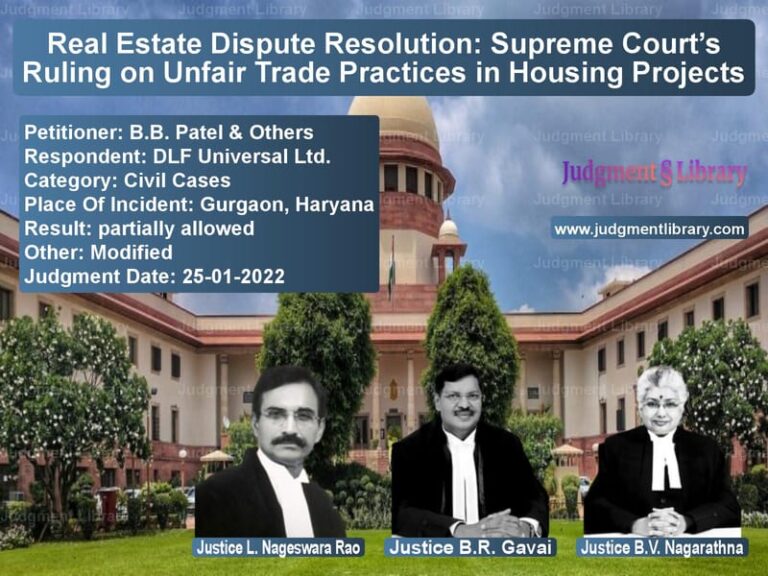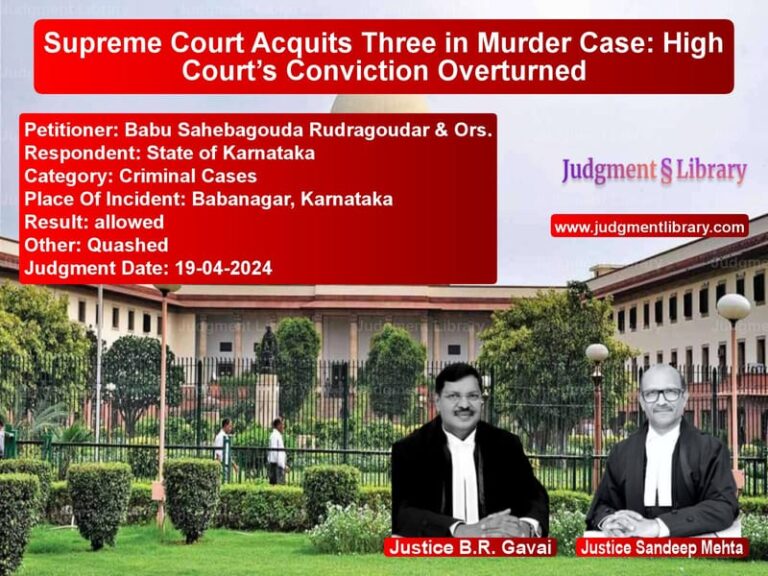Supreme Court Rules on Banking Regulation Act and Agricultural Debt Relief: A Landmark Judgment
The Supreme Court of India recently delivered a landmark judgment in the case of Jayant Verma & Ors. v. Union of India & Ors., which addressed the constitutional validity of Section 21A of the Banking Regulation Act, 1949. The case revolved around whether this provision, which prevents courts from reopening transactions between banks and borrowers on the ground of excessive interest rates, disproportionately impacted farmers and violated constitutional protections.
The petitioners, citing evidence of farmer suicides and increasing debt burdens, challenged the provision, arguing that it gave unchecked power to banks to charge exorbitant interest rates without any judicial scrutiny. On the other hand, the respondents, including the Reserve Bank of India (RBI) and the Union of India, defended the provision, asserting that banking falls under the exclusive jurisdiction of Parliament, and any interference with it would disrupt the financial sector.
Background of the Case
The petitioners were primarily farmers and agricultural activists who contended that Section 21A of the Banking Regulation Act unfairly allowed banks to enforce high interest rates on agricultural loans without judicial oversight. They presented evidence from various reports, including a Parliamentary Standing Committee Report on Agriculture, which highlighted how the provision had led to an alarming rise in farmer indebtedness.
They argued that the provision prevented courts from intervening even in cases where farmers were being forced to pay interest rates far above reasonable levels. The burden of such loans often led to extreme distress, forcing many farmers into a cycle of perpetual debt and, in some cases, even suicides.
In response, the Union of India and the RBI argued that banking regulation falls exclusively under Entry 45 of the Union List, meaning that only Parliament has the power to legislate on matters related to banking. They further contended that any judicial intervention in loan agreements between banks and borrowers would undermine the stability of the banking system.
Petitioners’ Arguments
The petitioners put forward the following key arguments:
- Section 21A violates fundamental rights under Articles 14 and 21 of the Constitution by depriving farmers of judicial relief against exploitative lending practices.
- The provision disproportionately affects farmers, who lack bargaining power against large financial institutions.
- Several State Debt Relief Acts aim to protect farmers from predatory lending, but Section 21A overrides these protections, effectively nullifying state laws.
- Reports from expert committees and commissions on agriculture have consistently recommended repealing or amending Section 21A to protect vulnerable borrowers.
Respondents’ Arguments
The Union of India, along with the RBI and various banking institutions, defended the provision on the following grounds:
- Banking regulation falls exclusively within the jurisdiction of Parliament under the Union List, and state governments cannot interfere in banking matters.
- Allowing courts to reopen loan agreements based on interest rates would create uncertainty in the financial sector and deter investment.
- Existing RBI regulations already provide sufficient safeguards against exploitative lending, and judicial intervention is unnecessary.
- Farmers and small borrowers have access to government relief schemes and loan restructuring programs, which offer sufficient protection.
Supreme Court’s Analysis and Judgment
After hearing arguments from both sides, the Supreme Court delivered a balanced judgment that upheld the constitutional validity of Section 21A but also provided relief to farmers in certain circumstances.
Validity of Section 21A
The Court upheld Section 21A, ruling that it is a valid exercise of legislative power under Entry 45 of the Union List. The judgment stated:
“We declare Section 21A of the Banking Regulation Act to be valid as it is part of an enactment which, in pith and substance, is relatable to Entry 45, List I of the Seventh Schedule to the Constitution.”
This ruling reinforced the principle that Parliament has exclusive authority over banking regulations and that state governments cannot interfere in such matters.
Exclusion of Agricultural Loans Under State Debt Relief Acts
However, the Court also ruled that Section 21A would not apply in cases where State Debt Relief Acts provide specific protections to farmers against excessive interest rates. The judgment clarified:
“Insofar as Section 21A incidentally encroaches upon the field of relief of agricultural indebtedness, set out in Entry 30, List II, it will not operate only in States where there is a State Debt Relief Act which deals with the subject matter of relief of agricultural indebtedness.”
This meant that in states where legislation specifically provided for farmer debt relief, courts could intervene to assess the fairness of interest rates imposed on agricultural loans.
Judicial Power to Intervene in Unfair Practices
The Supreme Court emphasized that while banks have the right to charge interest as per contractual agreements, courts could still step in if there was evidence of fraud, coercion, or other unfair practices. The judgment noted:
“The bar on judicial review under Section 21A is not absolute. Courts retain the power to intervene in cases where there is prima facie evidence of fraud or unconscionable conduct.”
Implications of the Judgment
This ruling has far-reaching consequences for banking and agricultural debt relief in India:
- Farmers in Certain States Can Seek Relief: The judgment ensures that in states with Debt Relief Acts, farmers can challenge unfair interest rates in court.
- Banking Sector Stability Maintained: By upholding Section 21A, the Court reassured financial institutions that loan agreements would remain enforceable.
- Judicial Oversight in Cases of Unfair Practices: Courts retain the power to intervene in cases of fraud or coercion, providing a safeguard against exploitative lending.
- Potential for Legislative Reform: The ruling may encourage Parliament to consider amending Section 21A to introduce explicit protections for vulnerable borrowers.
Conclusion
The Supreme Court’s judgment in Jayant Verma & Ors. v. Union of India & Ors. is a landmark decision that balances the need for financial regulation with the rights of borrowers. While upholding the constitutional validity of Section 21A, the Court has ensured that state laws protecting farmers from predatory lending remain effective. By allowing limited judicial intervention in cases of fraud and unfair practices, the ruling provides a critical safeguard against abuse while maintaining the stability of the banking sector.
This decision is expected to have a lasting impact on agricultural finance, prompting state governments to strengthen debt relief laws and encouraging Parliament to reconsider reforms to banking regulations in favor of more equitable lending practices.
Petitioner Name: Jayant Verma & Ors.Respondent Name: Union of India & Ors.Judgment By: Justice R.F. Nariman, Justice Navin SinhaJudgment Date: 16-02-2018
Don’t miss out on the full details! Download the complete judgment in PDF format below and gain valuable insights instantly!
Download Judgment: Jayant Verma & Ors. vs Union of India & Ors Supreme Court of India Judgment Dated 16-02-2018.pdf
Direct Downlaod Judgment: Direct downlaod this Judgment
See all petitions in Fundamental Rights
See all petitions in Legislative Powers
See all petitions in Public Interest Litigation
See all petitions in Judgment by Rohinton Fali Nariman
See all petitions in Judgment by Navin Sinha
See all petitions in partially allowed
See all petitions in supreme court of India judgments February 2018
See all petitions in 2018 judgments
See all posts in Constitutional Cases Category
See all allowed petitions in Constitutional Cases Category
See all Dismissed petitions in Constitutional Cases Category
See all partially allowed petitions in Constitutional Cases Category







